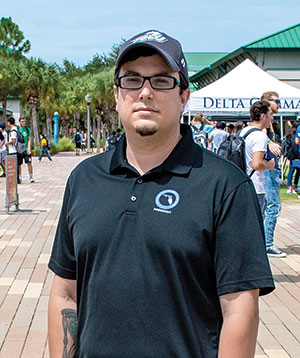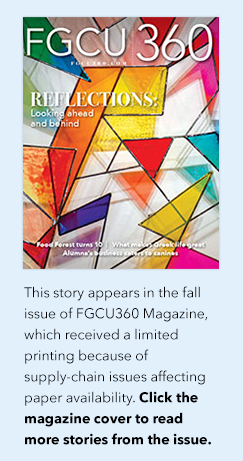It consists of the 1,381 members of the 28 FGCU fraternities and sororities. While representing 12 percent of the student body, the group accounts for many individual and group accomplishments since Fraternity and Sorority Life (FSL) was established at FGCU in 2003. Under the leadership of Julie Gleason, assistant dean and director of FSL, fraternities and sororities have grown tremendously.

The social component of Greek organizations is one reason people join. While in their undergraduate chapters, members develop lifelong friendships. Their brothers and sisters often serve in their wedding parties, as godparents to each other’s children and references for employment opportunities. These connections are invaluable, but there are other advantages, too.
Since 2012, the FSL community’s GPA has risen consistently. Except for two semesters, the fraternities and sororities have earned higher GPAs than the campus average.
“Academics is one of the main focuses for all organizations of NPHC,” National Pan-Hellenic Council President Shantae Clarke says. “Our council is proud to have some of the highest GPAs throughout FGCU’s FSL community.”

Additionally, members of fraternities and sororities have earned higher GPAs than the men and women on campus. During 2020, the average fraternity member GPA was 3.17 compared to the all-men’s average of 3.08. The average sorority member GPA was 3.39 compared to the all-women’s average of 3.31.
FSL organizations focus on service to the community and raising money for philanthropy as well. Whether working with national organizations like St. Jude Children’s Research Hospital or Make-A-Wish, collaborating with local organizations, or volunteering at nonprofits, fraternities and sororities are involved at FGCU and the community beyond.
Since their founding, the university’s Greek organizations have raised more than $1 million for charity. COVID-19 didn’t stop these efforts. During 2020, the community raised $90,142 through innovative virtual fundraising challenges and by adapting events to meet health and safety guidelines.
“Philanthropy is a great way to help our community,” says Panhellenic Association President Gracie Mercurio. “It’s amazing being able to spread love and raise money and awareness with a group of people who have the same goal in mind.”
While FGCU students need 80 service-learning hours to graduate, most FSL members complete this requirement during their freshman or sophomore year then keep going.
“Service to us means supporting and enriching, not only our university community, but the communities around us,” says Multicultural Greek Council President Denise Lobos. “We strive to make a wide-scale difference and be contributors to society.”
On average, an FSL member serves more than 50 hours per year, earning 207 service-learning hours before graduation.

Many chapters pride themselves on leadership as a core value, and it shows when looking at involvement statistics throughout campus. Whether it is FGCU’s top leadership positions, starting and leading student organizations, or top honors given to graduates, members of fraternities and sororities can always be found leading the way.
Since 2006, all but two Student Government presidents have been affiliated with a fraternity or sorority. The majority of vice presidents and executive officers all belonged to FSL chapters.
Ten of the last 15 presidents of the Programming Board, FGCU’s largest student organization, came from FSL. The 2019-20 Leadership Education and Development Team had seven of 10 members in an FSL organization. The fraternity and sorority members can also be found throughout campus as resident assistants, orientation leaders, teaching assistants, academic tutors, PEERS CARE mentors, student organization presidents and student employees.
 Within FSL, the Order of Omega honor society consists of the top 5 percent of fraternity and sorority members who best represent the values of the chapters.
Within FSL, the Order of Omega honor society consists of the top 5 percent of fraternity and sorority members who best represent the values of the chapters.
“Order of Omega has developed me into an open-minded leader,” President Morghan Hogg says. “Our members are continuing to learn each day how to be better leaders through the different organizations we collaborate with.”
The FGCU Hall of Fame is the highest recognition given to student leaders who demonstrate superior leadership, integrity and achievement as members of the university community. Since it was established in 2007, the Hall of Fame has had 143 inductees. Of those, 49 have been members of a fraternity or sorority.
The fraternity and sorority experience comes with a lifetime membership. This means that alumni can remain involved in FSL chapters, and they also are more likely to remain involved with their university.
Many FGCU faculty and staff are alumni of FSL chapters either at FGCU or other institutions. Chair of the Alumni Board of Directors, Michael Nachef, is an alum of a fraternity on campus and is vice president of governmental relations for Lee Health.
“Joining fraternities and sororities can enhance your collegiate experience by beginning lifelong connections and building foundational skills that will prove helpful well after graduation,” Nachef said. “My time as an undergraduate brother in Sigma Phi Epsilon at FGCU helped refine my leadership skills and provided a network of brothers and friends I still lean on today more than a decade after graduating.”
Many FGCU faculty and staff give their time to serve as advisors for the undergraduate chapters of fraternities and sororities they are now alumni of.
Even President Martin belongs to a fraternity.
— Sam Palmisano is in the environmental studies master’s program and is the Interfraternity Council president. He earned a bachelor’s degree in economics in 2019, an MBA in 2020 and served as president of his fraternity, Beta Theta Pi, graduating cum laude and was named to the FGCU Hall of Fame.
[/vc_column_text][vc_column_text]
FGCU FRATERNITY AND SORORITY CHAPTERS
INTRAFRATERNITY COUNCIL
- Alpha Epsilon Pi
- Alpha Tau Omega
- Beta Theta Pi
- Kappa Alpha Order
- Kappa Sigma
- Phi Delta Theta
- Pi Kappa Alpha
- Pi Kappa Phi
- Sigma Chi
- Sigma Phi Epsilon
MULTICULTURAL GREEK COUNCIL
- Lambda Upsilon Lambda – Fraternity
- Sigma Iota Alpha – Sorority
- Sigma Lambda Beta – Fraternity
- Theta Nu Xi – Sorority
NATIONAL PAN-HELLENIC COUNCIL
- Alpha Kappa Alpha – Sorority
- Alpha Phi Alpha – Fraternity
- Phi Beta Sigma – Fraternity
- Sigma Gamma Rho – Sorority
- Zeta Phi Beta – Sorority
PANHELLENIC ASSOCIATION
- Alpha Chi Omega – Sorority
- Chi Omega – Sorority
- Delta Delta Delta – Sorority
- Delta Gamma – Sorority
- Kappa Delta – Sorority
- Phi Mu – Sorority
- Sigma Alpha Epsilon Pi – Sorority
- Zeta Tau Alpha – Sorority